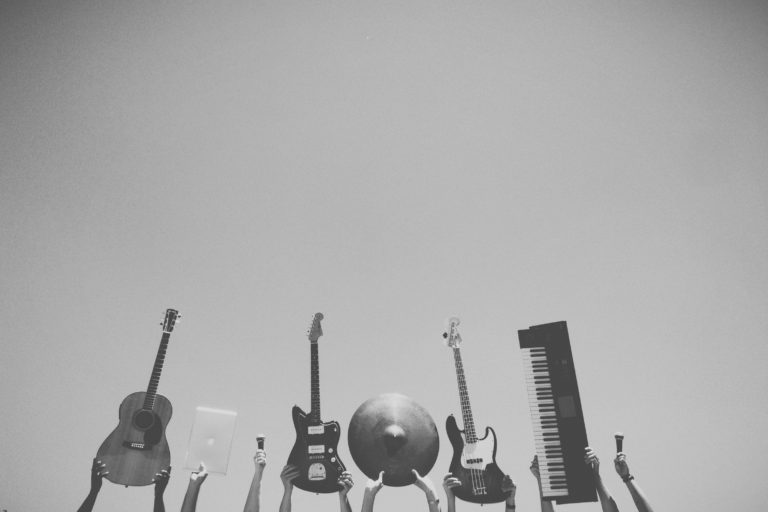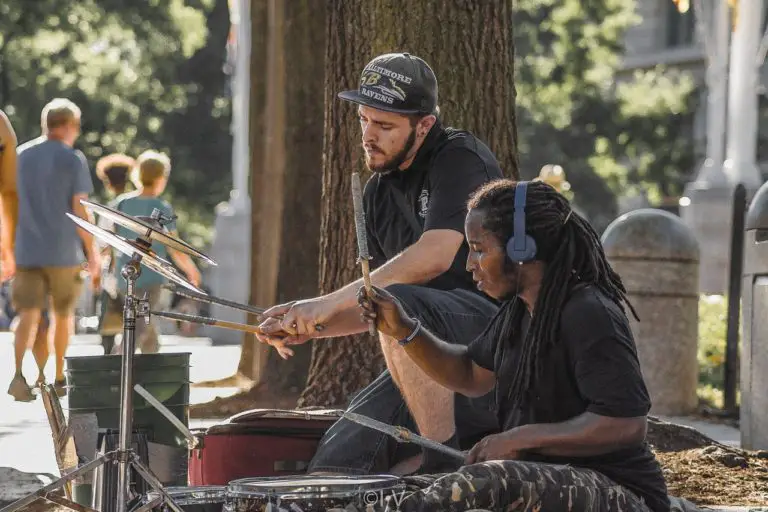Are Pay to Play Shows a Scam?
When you dream of earning a living as a musician, the idea of losing money to perform seems twisted. Venues offering “pay-to-play” shows may advocate that exposure is all that counts. Struggling bands say otherwise.
What’s the deal with these unusual shows? Are pay-to-play shows a scam?
From a musician’s perspective: yes. Concert owners say they’re an excellent way to grow your fanbase. Others say they exploit those who dare to dream that they may one day break even.
Who’s right? Don’t be too upset when we say, “it depends.” Instead, we’ll present the information about pay-to-play shows so that you can make your own decision.
Are Pay to Play Shows Legal?
Next time a venue offers your band an “opportunity” to play for a fee, don’t go running to the courthouse. As long as there is no deceit behind the arrangement, pay-to-play shows are legal. Bands and artists willingly decide that they’re OK paying venues for the exposure, which is fair in the eyes of the law.
However, certain situations straddle the legal line. For example, many sleazy promoters offer bands the chance to play if they sell a certain amount of tickets for another band. They may provide a small commission on each ticket, making the deal attractive to some. However, if the victim band fails to sell enough, they may be forced to buy the unsold tickets.
Also, scams may require bands to purchase the tickets before the show and resell them. However, selling all the tickets to break even is near impossible. So instead, the “promoter” sells out at the expense of the victim.
Ultimately, just because something is legal doesn’t mean it can’t be unethical. Some pay-to-play shows provide excellent value in promoting great artists. Others are predatory. Whenever you or your band considers playing a gig, always consider if the value proposition makes sense. If not, look elsewhere.
Why Do Artists Pay to Perform?
Why do artists pay to perform? One word: exposure.
Most artists and bands sign up for pay-to-play shows with the idea that audience members may buy tickets for their future gigs. Sometimes this works. Ultimately, artists pay to perform because publicity paired with entertaining music leads to success. Many famous bands, including The Rolling Stones, The Beatles, and Paramore, took the “exposure first” strategy by playing as cover bands.
Sometimes, however, promoters aren’t honest about the value of the arrangement. For example, they may not anticipate significant turnout and neglect to mention that. Instead, promoters may expect ten people to show up. Any more would prove a startling surprise.
But the question becomes: if venues expect a high turnout, shouldn’t they be able to pay their bands?
Club owners know that great bands are worth the money. Accepting direct payment from (potentially) awful bands would drive away their clientele, losing money. Thus, any location that offers real exposure is more likely to give bands their fair share. Otherwise, amazing bands will realize they’re worth more and fail to return.
Should My Band do Pay to Play Shows?
For some bands, pay-to-play shows make sense. But is your crew one of them?
There are two criteria your band should meet for the answer to be “yes.”
- Your band has no bargaining power.
- There’s a sizeable budget set aside.
The first question applies to newly-formed bands. If you haven’t played local gigs and have no listeners yet, a pay-to-play show can jumpstart your band’s marketing plan. Secondly, it’s wise to have a predetermined budget for pay-to-play shows. Otherwise, you risk exhausting your funds and burning out prematurely.
Whatever you do, don’t get stuck. Always value yourselves and your music. Think of pay-to-play shows as unpaid internships. While they aren’t ideal, they can help you gain valuable connections in the music industry. Afterward, though, it’s time to get paid for your talents.
But remember, there are situations where the answer is always a stern “no.” Unfortunately, many pay-to-play opportunities are part of many music industry scams. For example, promoters who require bands to sell enough tickets to fully book a show (i.e., 100 or more) are typically disingenuous.
However, if your band is asked to sell a dozen presale tickets, that might be a decent opportunity. Just be on your guard and do your research. Crunch some numbers and, to be cautious, assume you could be scammed and plan accordingly.
Are Pay-to-Play Shows Worth It?
If you’re aware of the risks and think, “pay-to-play seems to be the best bet for my band,” that’s understandable. After all, every musician knows the value of publicity.
But are pay-to-play shows worth it? Does the recognition offset the expense? The answer: generally no.
Try telling your utility company that you will pay for them in exposure. I imagine you’ll lose electricity before long. Otherwise, you can a look at a top 100 list of people who want to pay artists in exposure.
It’s hard to put a dollar number on exposure. Too many factors say, “gig X earned this band X dollars from publicity over their lifetime.” So instead, we have to rely on anecdotal evidence from bands who’ve gone the pay-to-perform route.
Most will say that pay-to-play shows are generally not worth the expense. Bands playing for free is already unfavorable, as bands consist of hard-working and talented people. When a band has devoted hundreds of hours practicing for gigs, refusing to pay them (or worse, demanding they pay you) is insulting. Generally, they’ll say that the only time pay-to-play is worth is when the audience is massive.
Pay to Play vs. Presale
Hopefully, you’ve got a good idea of pay-to-play shows. A promoter offers your band a chance to play to an audience for a fee. Instead of venues giving you a check, they pay you in exposure.
So what about presale tickets?
Presale tickets resemble preorders. When you preorder a video game, you may get additional content as an incentive to pay sooner. Bands do the same thing with their fans, offering exclusive deals to former attendees to get them to return.
What does this have to do with pay-to-play? Sometimes, another band’s promoter may say, “you can play if you sell 20 presale tickets.” This is a form of pay-to-play, but with the possibility of a win-win-win situation (keyword: possibility).
There’s some good news. First, your band won’t face a loss if you sell all the tickets. Their band also gets immediate payment. The audience benefits with access to special offers, discounts, merch, and more.
Again, though, caution is vital. Any time your band must cough up funds to perform, consider your options.
Tour Buy-Ons
The last type of pay-to-play arrangement we’ll discuss is tour buy-ons. What are they? A tour buy-on is when a headlining band charges lesser-known artists a large lump sum to open their show.
Mötley Crüe (evidently) charged an opening act $1 million to perform at their show. But it’s not just them — other famous artists do this all the time.
For the most part, bands offer buy-ons to increase revenue or cover touring expenses. Because it’s so common nowadays, successful artists accept the practice without considering ethics.
After all, there are plenty of optimistic, up-and-coming bands happy to pay whatever it takes. Even if they came for the headliner, performing for thousands of fans offers massive exposure. Of course, the chances of making more than the cost of the buy-on is grossly uncertain.
This is not to say tour buy-ons are garbage. If you strategize, they can jumpstart your career — this video explains how:
Pay to Play Alternatives
Not too fond of paying to perform? We completely understand. After all, you probably expected your band would be making money at this point. So what else can you do to get your name out there?
Correctly utilized, the Internet is a blessing for artists. SoundCloud, YouTube, and TikTok are the best fame-building tools available. Best of all, they’re virtually free.
For example, artists including Post Malone and Billie Eilish achieved popularity at lightning speed through SoundCloud. While your band might offer a different music style than them, a SoundCloud profile still provides excellent opportunities. Of course, it’s best to make your music available on as many platforms as possible.
If someone in your band has decent cinematography skills, consider uploading a music video to YouTube. Furthermore, consider creating a short video of your crew at peak performance and post it on TikTok. And if you’re really serious, Spotify is a significant step forward.
Ultimately, always have your ears open to feedback. When you pay to perform, it’s hard to tell how people feel about your music. It feels good if venues start offering paid gigs and fans ask you about your next release. You’ll know if you realize your music is largely ignored on social media despite your best efforts.
While some musicians get lucky, there’s no shortcut to stardom. Your band grows with criticism, practice, and determination. Listen to the people, and they will guide you to success.
Conclusion
Pay-to-play shows can offer the recognition your band needs, but there are other ways. Unfortunately, too many people in the music industry are trying to make a dirty dollar. To combat this, put your foot down and demand what you’re worth.
Sure, there are legitimate reasons to consider paying to perform. Yet, your band should set some boundaries after one or two. Musicians like you work hard. Most of the time, you work harder than your friends working 9-5 jobs. If your music is fantastic, your paycheck should be, too.








